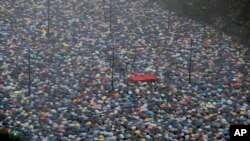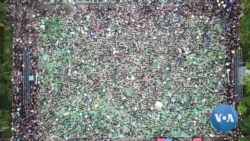Tens of thousands of pro-democracy demonstrators marched peacefully through the streets of Hong Kong on Sunday, the 11th weekend in a row of anti-government protests.
The Civil Human Rights Front, the driving force behind the Hong Kong protests throughout the summer, had called for a "rational, non-violent" demonstration on Sunday.
Protesters had previously clashed with police in the streets during other weekend protests and for two days last week at Hong Kong's international airport, leading to the cancellation of nearly 1,000 flights.
On the eve of Sunday's rally, Canada released a joint statement with the European Union in defense of the "fundamental right of assembly" for Hong Kong citizens.
Canadian Foreign Minister Chyrstia Freeland and EU Foreign Policy Chief Federica Mogherini said: "Fundamental freedoms, including the right of peaceful assembly — must continue to be upheld."
The Chinese Embassy in Ottawa published a statement on its website, saying that Canada should "immediately stop meddling in Hong Kong affairs and China's internal affairs."
Meanwhile, Taiwan has offered to grant political asylum to participants in Hong Kong pro-democracy movement, an offer that also has angered China.
The spokesman for China's Taiwan Affairs Office, Ma Xiaoguang, said Monday the offer would “cover up the crimes of a small group of violent militants'” and encourage their “audacity in harming Hong Kong and turn Taiwan into a “heaven for ducking the law.''
Ma demanded Taiwan's government “cease undermining the rule of law'” in Hong Kong, cease interfering in its affairs and not “condone criminals.”
Hong Kong residents say they worry about the erosion of freedoms guaranteed under the "one country, two systems" that has been in place since the territory's return from British rule to China in 1997.
Protesters' demands
The protests have coalesced around five demands, including the complete withdrawal of an extradition bill, an investigation of police violence during the protests and exoneration for all those arrested in the demonstrations.
Most iterations of the demands also call for the resignation of Carrie Lam, the Beijing-backed chief executive in Hong Kong, and some form of enhanced democratic freedoms, such as universal suffrage.
U.S. President Donald Trump, whose administration is engaged in a lengthy tit-for-tat tariff war with China as the world's two biggest economies try to negotiate a new trade pact, said last week that Chinese President Xi Jinping should personally negotiate with the demonstrators to reach an accord on the rights of Hong Kong's 7.5 million people.
"If President Xi would meet directly and personally with the protesters, there would be a happy and enlightened ending to the Hong Kong problem. I have no doubt!" Trump said on Twitter.







